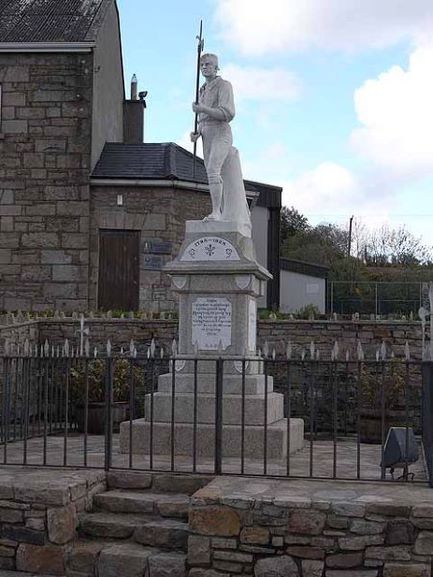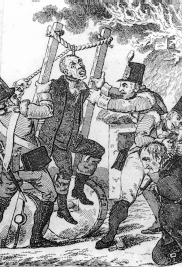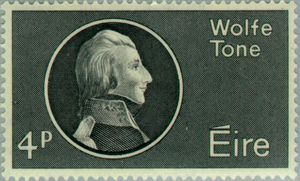A web site visitor asked if Wolfe Tone is in ClanDonnell. The visitor is a distant cousin of Wolfe Tone.
The answer is of course, although only a wee bit.
The book tells a number of stories about The 98, which is how the Irish refer to the rebellion against the British fought in 1798. The 98 was a haphazard, sporadic affair. It was fought in the summer of 1798 and extended into the early autumn. But by extending into the harvest season, thousands died from starvation and disease in the months that followed.
It was one of the few uprisings in Ireland without religious overtones, at least in the beginning. The intellectual leaders included many Protestants, including Theobold Wolfe Tone. Tone’s essay in 1791 was not unlike Thomas Paines Common Senses, which sparked the American Revolution. The Catholic establishment, including church officials, opposed the rebellion, although many young, activist priests joined in.
But as the fighting got hot, the rebellion turned ugly. Protestant farmers, or yeomen, took up arms on behalf of the British and committed more than their share of atrocities. The British propaganda machine did much to stir up religious divisions.
Here’s one story, told by an elderly woman in the mid-19th Century about her experience as a four-year old girl. As tears rolled down her cheeks, the woman said:
I remember it well. Our house stood within forty yards of the main road. Twas a Sunday afternoon, and none of us had been to Mass that day, in consequence of the vile conduct of the sogers and Downshire’s yeomanry towards those whom they met coming from chapel. A loud knock was heard at the door: it was opened, and in rushed twelve or fourteen of (yeomen). They wanted arms; at least they said so. Father’s old rusty gun was slung across the fire-place; one of them reached for it, and as I happened to come against him, he struck me with the butt end of it, and I fell hands foremost into the fire. I was only four years of age, and see, I bear the marks of the burn on my hands to this day.
ClanDonnell tells these, and other stories about The 98. It tells stories of the martial law and summary hangings, the Irish croppies, the few battles, the Irish pike weapon. The French got into the fray for a bit and sent an army into County Mayo. They were in Mayo for only a few months, although the affair is still called The Year of the French.

The photograph is a statue of a 98 Irish pikeman. The memorial is in Ballinamuck, the site of the last battle in the Year of the French. There is a short summary of the Battle of Ballinamuck in the pdf link below, prepared by the Irish Cultural Society of the Garden City Area in New York.
(Some translation might be required here. Sogers in the woman’s account is the writer’s spelling of soldiers. Yeomen were civilian volunteers, enlisted by the British to assist in crushing the rebellion. The 98 rebels were often called pikemen. The rebels had precious few muskets and the weapon of choice was the pike. It was a medieval weapon, but the only weapon easily forged for the rebels. It was simply a shaft up to 12 feet long with an iron tip.)
James Joseph McDonnell was another instigator of the rebellion. He was a Catholic lawyer and friend of Wolfe Tone — yet another rare example of Catholics and Protestants working together in the era. He became an Irish hero for his role in the Year of the French. The British hanged most Irish participants but couldn’t find McDonnell despite offering a huge reward for his capture. McDonnell ended up in the United States. Decades later, at the age of 80, he became a judge in New Jersey. He died in 1849.
When the war ended, the British had to come up with a way to solve the pesky Irish problem. They did so by abolishing Ireland.
Ireland was nominally an independent nation in 1798, with its own Parliament but under the sovereignty of the British king. Independence was a farce, of course, and Ireland was administered much like any other British colony. But after The 98, the British did away with the Irish Parliament and incorporated Ireland into Great Britain. The country formerly and formally known as the ‘Kingdom of Great Britain’ became the ‘United Kingdom of Great Britain and Ireland.’

Wolfe Tone was in France during the rebellion, trying to secure more help from the French. By the time he left for Ireland in October, the rebellion was over. Tone was captured by the British and convicted of treason. He requested to be shot as a soldier but was sentenced to be hanged. To avoid hanging, he stabbed himself in the neck with a penknife. The penknife opened an artery and Tone bled to death.
Many Irish were hanged for their participation in The 98, many by ‘half hangings’ as shown in the illustration. The illustration, from an 1810 English cartoon, shows the mobile device used to hang rebels in The 98.

Wolfe Tone, to my knowledge, was the only Irishman killed by penknife.
The illustration is The Death of Wolfe Tone by Walter C. Mills, for Irish Weekly Independent, 1897. Theobold Wolfe Tone was commemorated in the 1964 postage stamp shown at the top of the page.
